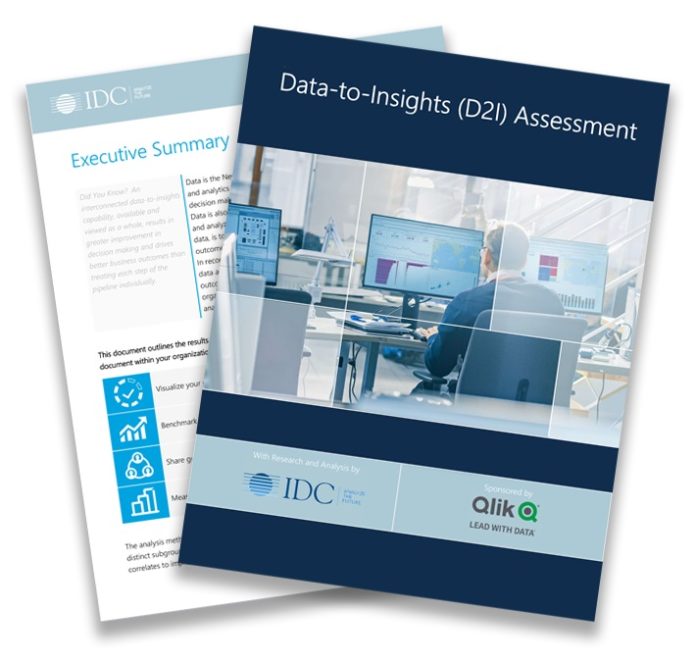IDC conducted a global study of 1,200 organizations to find out how closely is data tied with business success. Sponsored by Qlik, the survey shows organizations that invest in creating data-to-insights (D2I) capabilities through modern data and analytics pipelines are seeing significant gains.
Through the new IDC hosted assessment tool (www.D2I-Score.com), every organization can evaluate the strengths and gaps in their own data pipelines. The tool also provides a set of recommendations that will help organizations better support and focus on strategic investments that can have significant bottom line impact.
“Organizations across the globe are missing a crucial opportunity to impact their performance by turning data into ongoing business value due to gaps in leaky data pipelines,” said James Fisher, Chief Product Officer at Qlik.
A new application from Qlik shows the detailed geographic breakdown of the significant differences in how respondents in key markets such as the US, UK, Brazil, Australia, Singapore and Japan are positioned to either reap the benefits or fall behind competitors based on the strength of their data pipelines.
The overall survey of 1,200 business leaders shows that companies carrying the highest demonstrable D2I capabilities through modern data analytics pipelines (Leaders) are seeing significant bottom line impact.
- 88% of Leaders said operational efficiency improved (versus 76% overall), and the average improvement was 21% (versus 17% overall)
- 86% of Leaders said revenue improved (versus 74% overall), and the average improvement was 23% (versus 17% overall)
- 90% of Leaders said profit improved (versus 76% overall), and the average improvement was 24% (versus 17% overall)
In Asia Pacific, the findings show key differences in how each country is approaching data pipelines and their D2I capabilities, and how those approaches are impacting business performance.
- The average D2I score is 41.8 across Asia Pacific. India showed the highest overall score at 47.4, with Australia close behind at 42.4. Singapore and Japan carried the lowest scores at 38.8 and 38.5, respectively.
- One of the strongest impacts of a higher D2I score beyond increase in profit or revenue is an increase in customer satisfaction/loyalty, essential for businesses during a COVID-19 impacted market. The overall average of increase in this category was 21.5%, with Australia leading with a 27% improvement, followed by Singapore (21%), India (20%), and Japan (18%).
- Virtually every company surveyed across Asia Pacific (96% or higher) reported a significant challenge in identifying which data sources were valuable. Singapore recorded the highest rate of this challenge (100%), followed by India (98%), Australia (97%), and Japan (89%).
Commentary by Geoff Thomas, Senior Vice President for Qlik in Asia Pacific
The Asia Pacific (APAC) region has always been a hotbed for the adoption of innovative and emerging technologies like big data, AI, and machine learning, as part of businesses’ plans to accelerate digital transformation in their operations. While this phenomenon has also put forward subtle pressures for APAC businesses to achieve significant bottom-line impact as part of their technological adoption, findings from our latest Data to Insights (D2I) study revealed that most businesses in APAC still fail in their efforts to fully leverage their data, with average overall D2I score across APAC at 41.8 out of 100.
Surprisingly, Singapore’s D2I score (38.8 out of 100) ranked one of the lowest, despite the region’s plans to establish itself as a leading data and analytics hub through its Smart Nation push and robust infrastructure that businesses can tap into. Countries like Japan, Australia, and India, on the other hand, showed scores of 38.5, 42.4, and 47.4, respectively, with India achieving the highest overall score in the region and one of the highest globally.
Singapore businesses struggle in three main areas:
- Identifying valuable data: All local business leaders surveyed found it challenging for their business to identify data sources that are potentially valuable. This is attributed to the lack of know-how in assessing the value of potential data as well as the lack of access to the right technology tools that can create and find valuable sources.
- Preparing analytics ready data: It is difficult for businesses to ensure data quality and confirm that all the relevant data has been captured and defined properly. This results in incorrect data, missing and incomplete data issues, and a poor understanding of data lineage – impacting the businesses’ ability to process the data into an analytics-ready form.
- Executing data analytics: Only 57% of Singapore business leaders report that more than half of their workforce is trained and equipped to do standard data analysis. Such levels of data literacy affect the ability of businesses to interpret and present the analytics in an accurate, clear, and persuasive form.
These findings point back to the importance of building a strong data pipeline to maximise return on investment in data – from identifying and gathering to transforming and analysing enterprise-ready data. Businesses looking to achieve this must invest in end-to-end data integration and analytics solutions that can help improve their data flow at every stage of the pipeline. This will not only increase their D2I scores but drive tangible business outcomes and significant bottom-line impact covering operational efficiency, revenue, and profit.
















